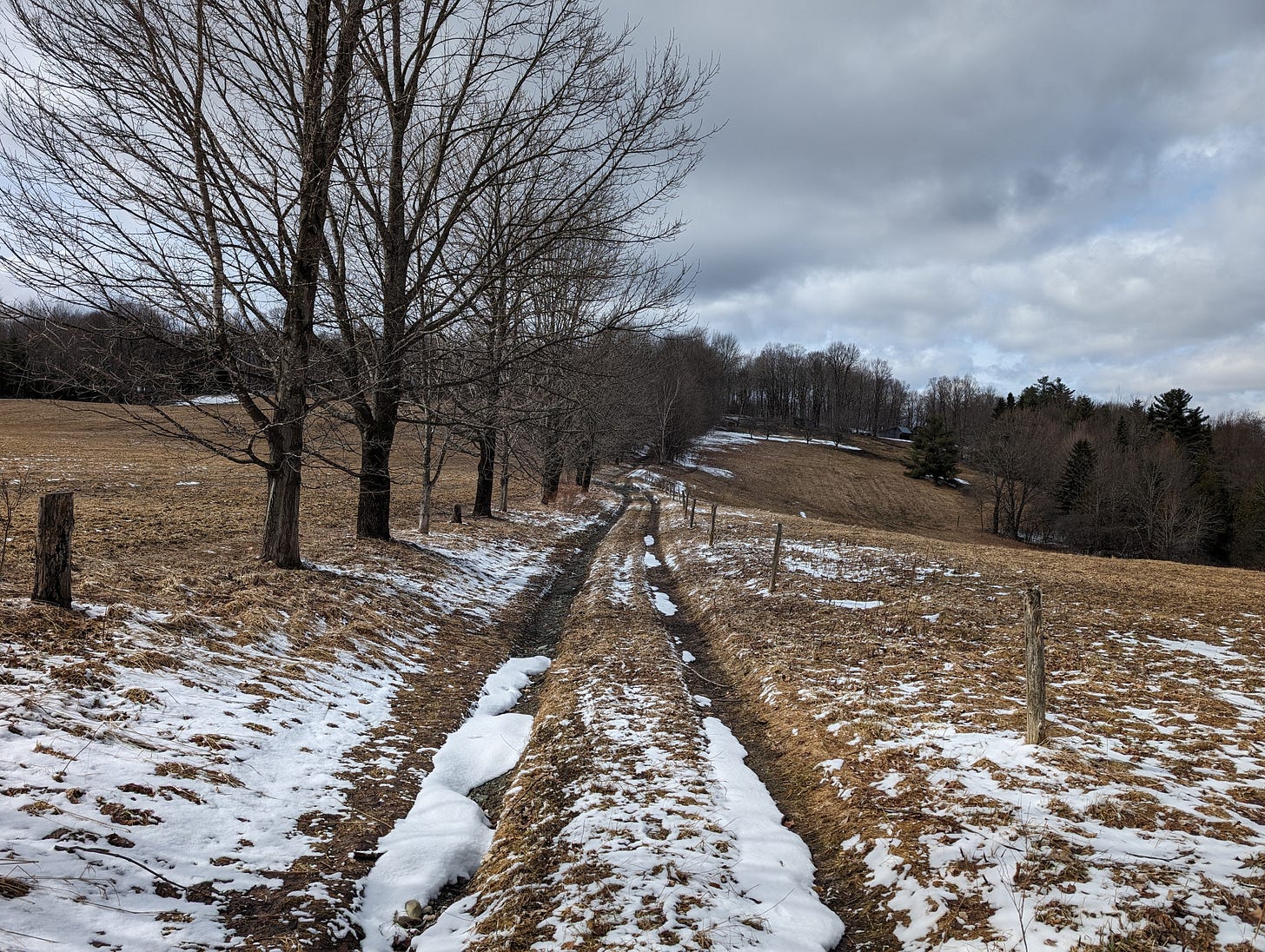Why are you doing this?
For Holy Week, Jesus prepares us with a question
Palm Sunday
When they were approaching Jerusalem, at Bethphage and Bethany, near the Mount of Olives, Jesus sent two of his disciples and said to them, “Go into the village ahead of you, and immediately as you enter it you will find tied there a colt that has never been ridden; untie it and bring it.”
“If anyone says to you, ‘Why are you doing this?’ just say this: ‘The Lord needs it and will send it back here immediately.’ ”
Mark 11:1-3
The Question
It is Palm Sunday. There are lots of things going on this triumphant day before things turn south, but as part of wrapping up Lent—a time of preparation that opened with John the Baptist “preparing the way”—I want to focus on how Jesus prepares his disciples for his Palm Sunday, and ultimately, for the end of his life: “If anyone says to you, ‘Why are you doing this?’ just say this, ‘The Lord needs it and will send it back here immediately.’” (Mark 11:3)
“Why are you doing this?”
Parents know that root question too well, “Why?” And then when you answer, it’s often followed up by another, “But why? But why? But why?” You don’t usually say, “Because I’m your parent, and you’re not smart enough to know better, and I’m too dumb to explain better.” Usually, it’s easier to say, “Because I said so.”
Jesus is more mysterious than that. He says the answer to this question, should we be asked, is, “The Lord needs it.”
Okay. But why?
Why do we do what we do?
If someone asks us why we’re doing what we’re doing in the world, how often could we honestly say, “Because the Lord needs it”? Not as often as we might like. If someone asks me this week, “Why are you watching March Madness?” I want to say because the Lord needs it, but I can only say for certain that my Tar Heels need it, for Saint/Coach Hubert Davis needs it, and surely his elders Saints Roy and Saint Dean need it, too.
Less cynically, when the church acts as Christ’s body, sometimes we can say we do things because the Lord needs it. When we help someone in need, when we are not just “hearers” but “doers”(James 1:22), when we “make our life a living sacrifice”, like a grain that must die to each other in order to give life. And we have the strength through faith to do these things, because we know that not only “does the Lord need it,” but as Jesus also says, he’ll “give it back.” If any Jesus-follower can act with any faith at all, it is because we trust the Lord needs it, and we also trust he’ll give it back in even better shape than when we gave it to him.
But maybe that’s still too noble for all of us. Maybe some of our honest answers to why we’re in church, whether it’s the first time for a long time this week or the last of a long line of Sundays, might be, “I don’t really know.”
And maybe the disciples didn’t know why they were there on Palm Sunday, either. But it probably was not for the holiest of reasons: “Because he’s gonna win!” “Because he makes us feel good!” “Because singing ‘Hosanna’ is awesome in a crowd when you can really hit the harmonies!” “Because the vibes in Jerusalem today are immaculate!” And weren’t they? Here’s the simple scene:
Then they brought the colt to Jesus and threw their cloaks on it; and he sat on it. Many people spread their cloaks on the road, and others spread leafy branches that they had cut in the fields. Then those who went ahead and those who followed were shouting, "Hosanna! Blessed is the one who comes in the name of the Lord! Blessed is the coming kingdom of our ancestor David! Hosanna in the highest heaven!"
Mark 11:7-10
Unlike those who were there back then, we in the Church today know the Palm Sunday party is going to be crashed, and we’re still here. Why?
Good question. So much of our story as a church is trying to answer, “Why are you doing this?” to the world. Why are we Christian? Why this walk of faith? Why are we doing this?
Some of us point to the creeds: “Because ‘I believe in God the Father Almighty….’” But maybe that’s not really why for you. Maybe you go to church because you were born in church and always believed. Maybe you go to church because your spouse thinks it’s important, and you don’t really get it, but you know you love them, and the people are nice enough most of the time. Maybe some of you out there are part of a “trad” movement that isn’t really sure what to believe about Jesus in a literal way but knows Christianity is part of Western civilization. Or maybe some of you can’t stand Western civilization and traditional Christianity—and also aren’t really sure what to believe about Jesus in a literal way—but go to church to help it live up to his radical vision. For some, it’s maybe it’s simpler. “I’m here to be in community.” Or “I want my kids to have good morals.” Or “I want to be a better person.” Or “to connect to my heritage.” Or maybe, “Oh, I had some crazy Jesus experiences on ayahuasca and somehow this resulted in me being a Presbyterian.”
Maybe we really don’t know why we’re here with other people, hearing these stories again, coming back to the table again. We know the next week has a journey and a story, and we know how it’s going to end. But maybe we don’t know the big reason, no more than the people untying the colt knew.
And maybe it’s okay not to know, for otherwise maybe it wouldn’t be faith. Maybe you can remember a time when you did something you had no idea how it was going to turn out at all but you chose to trust God anyway. Maybe you didn’t even know you were trusting God; maybe you didn’t even know God’s name, and maybe you still don’t know how you feel about even using “the G-word,” but you trusted something that felt like an insane love, and you did something that took a risk, and if someone asked you why, all you could mumble is “I don’t know,” or, “I just felt like I had to do it.”
But maybe all that is still too noble to describe our spiritual path, for often if we scrape down, just like the disciples, we may not have very good, noble, or holy reasons at all for why we are pilgrims on the path. Maybe we’re here for ourselves.
What’s funny about this “why are you doing this” question is that Jesus doesn’t actually ask us why. Sure, he painfully reckons with his call in the Garden of Gethsemane, and he later asks his father on the cross, “Why have you forsaken me?” in a rhetorical “why,” quoting the Psalms in pain. But he seems to know. And instead of asking us why, he just prepares us for when we ask each other that question, maybe in an accusation, questioning each other’s spiritual motives. “Why are you a Christian? Oh I know, you just want to feel better than others.” “Why are you Christian? Oh I know, you just want to put a holy garnish on your politics.” And maybe sometimes we’re right, but maybe sometimes we’re unfair, and maybe we don’t judge ourselves in the same manner but we’re great at projecting.
But if we ask each other “why” in accusation, Jesus doesn’t ask “Why are you doing this?” even when the twelve betray and abandon him, or when we do the same to him each day. He knows our bad reasons. And he loves us anyway.
Turning the question around
The disciples had really been asking him this all along, but now it’s getting serious. He’s gone into the hands of his enemies, the walls of the city closing around him, and maybe in the days after Palm Sunday, things are getting tense. “Why are you doing this Jesus? Why are you not leading a revolt? Why are you not playing better politics? Or why are you saying ‘I’ll die’?” Maybe they’re asking God, “Why are you sending your son? Why does his death mean anything about defeating sin? Why couldn’t you have done it another way?” Peter rebuked Jesus earlier for this plan without even asking why (Mark 8:31-33).
Maybe we’re making it too complicated. The theologian Karl Barth, who wrote so much on Christianity that even the nerds grew tired of reading him, was once asked by a student if he could summarize his theology in a single sentence. Legend says that Barth responded, "In the words of a song I learned at my mother's knee: ‘Jesus loves me, this I know, for the Bible tells me so.’”
But maybe this is not enough for us. And if we are all God’s children, sometimes we are the ones asking that annoying, “But why? But why do we need a savior? But why does he need to even be a person at all? But why do all that?”
I don’t know. But I am reminded of what Paul said of his own gospel mission: “To the Jews, I became as a Jew to win the Jews…To those under the law I became as one under the law, and to those not under it I became as one not under it…To the weak I became as weak, to win the weak,” all saith Paul (1 Cor 9:20-22).
Perhaps when we ask Jesus this week and throughout our lives, “Why are you doing this?” He might answer, “To the humans, I became a human in order to win them, that they might know I love them as one of them.”
To the political rebels, he became a political rebel so that they might know he also opposes earthly power.
To the devout, he became devout so that they might know he prays and loves God with us.
To the social workers, he cared for the poor in a way that humbled their service.
To the warriors he became a warrior against demons a Roman legion could not defeat.
To the healers, he became a healer not only of body, but of soul.
To the sorcerers, alchemists and entertainers, he worked miracles that even amazed them.
To the religious scholars, he became a scholar who knew the law better than they.
To the partiers, he turned water into wine.
To the lovers, he became a more pure lover than any love they had ever known.
And even to the kings this woodworking kid from Nazareth became a king, riding in as one, so that the hearts of kings might be conquered.
But…
Just as the kings might have been confused about what a true king was when he came on a donkey…
…the rebels were confused about what kind of rebel he was.
The devout were confused about the nature of his devotion.
The social workers were confused when he said, “You will always have the poor with you but not me” (Mark 14:7).
The warriors were confused because he was a non-violent spiritual warrior.
The healers were confused that he also called people to repent and turn around their lives.
The sorcerers and alchemists and entertainers were confused how his miracles worked, and to what purpose, and that he didn’t care about the popular power he got, because he knew it was fickle anyway.
The scribes were confused about his interpretations, that all of the law was a gift, not a cudgel.
The partiers were confused when the music faded.
And the lovers were confused when his love also challenges us to leave behind the sin that we love even more.
So we can be excused if we are confused, too.
Why is Jesus doing this? Maybe God became one of us to get closer to us. Maybe God knew that we suffer and that we would need to know that God suffers with us. Maybe we needed a God who sees those of us who are lowly, without power, at the mercy of this crazy world, a world that changes faster than we can think, and that we needed to see that God rides in with the lowly and uses what’s available. Maybe we needed to see that God connects the present with our past and future, bridging who we were to who we are and to who we’ll be. Maybe we needed to see the prophecy fulfilled, the story of the people of Israel through their Original Covenant is now something all are invited into in a New Covenant, a gift opening itself on God’s terms. Maybe we needed to see again and again that when we reject God’s gifts, God will always say, “I will keep trying until these people can know me. I will learn how to ‘speak human.’”
Only God knows. But when we ask him, “Why are you doing this?” Jesus says not only “Because the Lord needs it,” but also, “Because I love you, and I know you need it.”
Even after the Hosanna echoes end, and the knives come back out, when we walk away from him, when we pretend not to know him when it actually costs us something.
Even when we collectively and individually crucify Jesus… he still does it.
Why? Why is he still doing this? As simple as the song: because he loves you.
Coda #1 - Personal note
Last week, there was a New York Times article on psychedelic research at Johns Hopkins that linked to my other newsletter, Psychedelic Candor. I won’t discuss those issues here, but I will be writing sporadically in that newsletter sometime after Easter.
Coda #2 - One Last Time with the Desert Fathers
Because we walked through Lent with the Desert Fathers, I wanted to fit in one last saying of theirs that didn’t quite fit in above, but seemed fitting for Palm Sunday:
Once there was a disciple of a Greek philosopher who was commanded to give money to everyone who insulted him for three years. When this was over, the Master said, “Now you can go to Athens and learn wisdom.”
When the disciple was entering Athens he met a certain wise man who sat at the gate insulting everybody who came and went. He also insulted the disciple who immediately burst out laughing. “Why do you laugh when I insult you?” said the wise man.
“Because,” said the disciple, “for three years I have been paying for this, and now you give it to me for nothing.”
“Enter the city,” said the wise man, “It is all yours.”
When Abbot John told this story, he would say, “This is the door of God. Our fathers rejoice in their many tribulations, and thus enter into the City of Heaven.”
With Jesus, let us enter God’s city through our tribulations.







